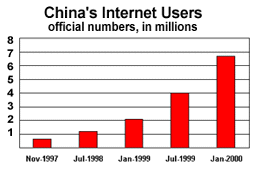The Internet: China's New 'Open Door' to the World
continued
 Qian Long’s letter started a long process of mutual trade frustration that flared in earnest with the First Opium War in 1842. There followed 100 years of history in which foreigners used new technologies of modern warfare to break down China’s door. The Japanese, the English, the Germans, the Russians, and the Portuguese all grabbed portions of Chinese territory by force during this period.
Qian Long’s letter started a long process of mutual trade frustration that flared in earnest with the First Opium War in 1842. There followed 100 years of history in which foreigners used new technologies of modern warfare to break down China’s door. The Japanese, the English, the Germans, the Russians, and the Portuguese all grabbed portions of Chinese territory by force during this period.
During the May Fourth Movement of 1919, Chinese students declared a "National Day of Humiliation" when the government failed to block the ceding of Germany’s territorial concession to Japan.
|
"For much of the Christian era prior to the 19th century, China had been far ahead of the West in technological development. Only towards the end of the 19th century did they begin to realize they had, in their insularity, fallen behind the West in the race to modernize." |
As rude as it was, Emperor Qian Long’s letter to the British trade envoy vividly portrayed a very distinct belief in the Imperial Chinese court that was not entirely without basis in historical fact. For much of the Christian era prior to the 19th century, China had been far ahead of the West in technological development. Only towards the end of the 19th century did they begin to realize they had, in their insularity, fallen behind the West in the race to modernize.
It was not until after the leaders of the 20th century, including Sun Yat-Sen and Mao Zedong, suffered at the hands of Western teachers who never fully accepted them, that a strong feeling of nationalism was encouraged in China. This surging nationalism, combined with inspiration taken from the October Revolution in Russia, led China under Mao to look for "truth in the cannons" of Marxism and to turn away from the Western capitalist model.
By 1952 the newly ascendant Communists echoed Qian Long’s letter by announcing the slogan for the annual campaign: "Attack the Americans, Aid the Koreans." For the next 20 years China’s door was firmly shut to the outside world and tragically, as the journalist Orville Schell points out, the self-inflicted wounds China suffered during the Great Leap Forward and the Cultural Revolution were greater than any ever caused by foreign intrusion.
In the late 1970s the debate about maintaining a Chinese identity arose again after the historic visit of American President Richard M. Nixon, in 1972, succeeded in opening China towards the West. Under Deng Xiaoping, who spearheaded China's great economic reforms, much of the demonizing of "Western imperialists" stopped. Deng replaced ideological maxims with his own pragmatic epigrams, like "To get rich is glorious," and "What does it matter if a cat is white or black, as long as it catches mice?"
Deng kept the door to Western ideas open enough that by the early 1980s economic reforms had taken root. Deng even visited America where he spotted and donned a ten-gallon cowboy hat reminiscent of the Old West, the American frontier.
America pioneered the Internet, the new frontier. Its use is being regulated now but it is still a space far more vast than the prairies once crossed by men on horseback in those ten-gallon hats.
Although the American imagination has made the Internet a vibrant place, its pioneers never imagined that the cowboys on their virtual frontier would soon be young, urban Chinese men a group that is forecast to outnumber all other Internet surfers worldwide within the first decade of the 21st century.
Given the decades of strict control on the flow of information in China, the ongoing explosion in Internet use should hardly come as a surprise. A vast appetite for information has been building up in China for years. Thanks to the Internet, that appetite is finally being fed. Now, content is king in China, too.
Tomorrow: Xu Bing: 'Twixt East and West

